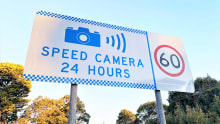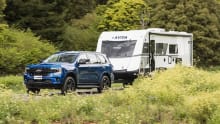
How much does it cost to replace a windscreen?
This used to be a simple question since most car windscreens were made from the...
Browse over 9,000 car reviews
.jpg)
No, it’s not illegal to live in your car in Australia - but there may be certain areas where it’s illegal to sleep in your car, so if you're thinking of moving in, you'll need to be careful where and when you park it.
There’s no federal law against living in your car, but states and councils are able to legislate around the issue.
In New South Wales, you may sleep in your car as long as you’re not breaching any parking laws, which sometimes are in place to prevent people from living in cars for extended periods of time. You’ll find that in many areas across Australia, such as South Australia, Western Australia and Tasmania, areas near beaches and parks, in particular, have parking laws that prevent people from sleeping and living in these locations.
In Victoria, sleeping in your car is not illegal but again, there may be heavy restrictions on parking in certain areas to discourage this. However, according to Victoria Law Foundation, you may be able to have a fine waived if you’ve broken a parking law due to homelessness or the impact of family violence.
In the Australian Capital Territory, you also have to abide by parking laws but other than that, you’re able to sleep in your car. Community Law Canberra has a helpful factsheet that explains your rights and what to expect if you sleep in your car.
For example, police may ask you to move on if you park in front of someone’s home and they are concerned about their safety due to your presence. But generally if you’re parked on a public road and not causing any disturbance, police are not required to move you on. They may approach you to see if you are okay, however.
In Queensland, be aware that the rules around living in your car are the strictest in the nation. According to Brisbane City Council’s information page, sleeping in your car is considered camping. As such, it is illegal is sleep in your car anywhere that is not a designated camping site.
It’s difficult to find information on specifics in the Northern Territory, but an NT News article from 2016 mentions that police do crack down on travellers camping, especially near beaches. According to the article, they’re unable to do more than issue an infringement if you’re just sleeping in your car, but in general we’d advise against living in your car in backpacker hotspots, such as streets near beaches.
If you or someone you know is homeless or at risk of homelessness, there are resources and places that can help:
In NSW, Link2Home can provide information and help you, or someone you are advocating for, access support services. Link2home is available 24/7 on 1800 152 152. NSW’s Domestic Violence Helpline can arrange emergency accommodation and assist with other services. Domestic Violence Helpline is available 24/7 on 1800 656 463.
In Victoria, Opening Doors can direct your call to a housing service near you during business hours or forward you to Salvation Army Crisis Services after-hours. Opening Doors is available 24/7 on 1800 825 955. Vic’s Safe Steps Family Violence Response Centre is a statewide response service for women, young people and children experiencing family violence. Safe Steps is available 24/7 on 1800 015 188.
In QLD, Homeless Hotline gives information and referrals to those experiencing homelessness or at risk. Homeless Hotline is available 24/7 on 1800 47 47 53 (1800 HPIQLD) or TTY 1800 010 222. Domestic Violence Telephone Service provides support, information, emergency housing and counselling. Domestic Violence Telephone Service is available 24/7 on 1800 811 811 or TTY: 1800 812-225.
In WA, Salvo Care Line helps people in crisis access housing services, counselling and other information. Salvo Care Line is available 24/7 on (08) 9442 5777. Women's Domestic Violence Helpline can help you find a refuge or just provide conversation and support if you would like to talk to someone who understands how you and your children are affected by abuse. Women's Domestic Violence Helpline is available 24/7 on (08) 9223 1188 or STD 1800 007 339.
In South Australia, you can consult a government list of homelessness-related services here. Included in this list are 24/7 gateway services for different groups of people who may be experiencing, or at risk of experiencing, homelessness. General support, including for families, is available 24/7 from 1800 003 308. Youth aged between 15 and 25 should call 1300 306 046 or 1800 807 364. For domestic violence and Aboriginal family violence, you can call 1300 782 200 or 1800 800 098.
In the NT, Shelter Me is a directory of services that can help you access help with housing, food, getting off drugs and legal advice. The NT government also has a list of crisis and support helplines.
In Tassie, Housing Connect can assist with emergency accomodation and long-term housing. Housing Connect is available 24/7 on 1800 800 588. The Family Violence Response & Referral Service offers support and access to services. Family Violence Response & Referral Service is available 24/7 on 1800 633 937.
This article is not intended as legal advice. You should check with your local road authority and local council areas to verify the information written here is suitable to your situation before using your car in this manner.










Comments